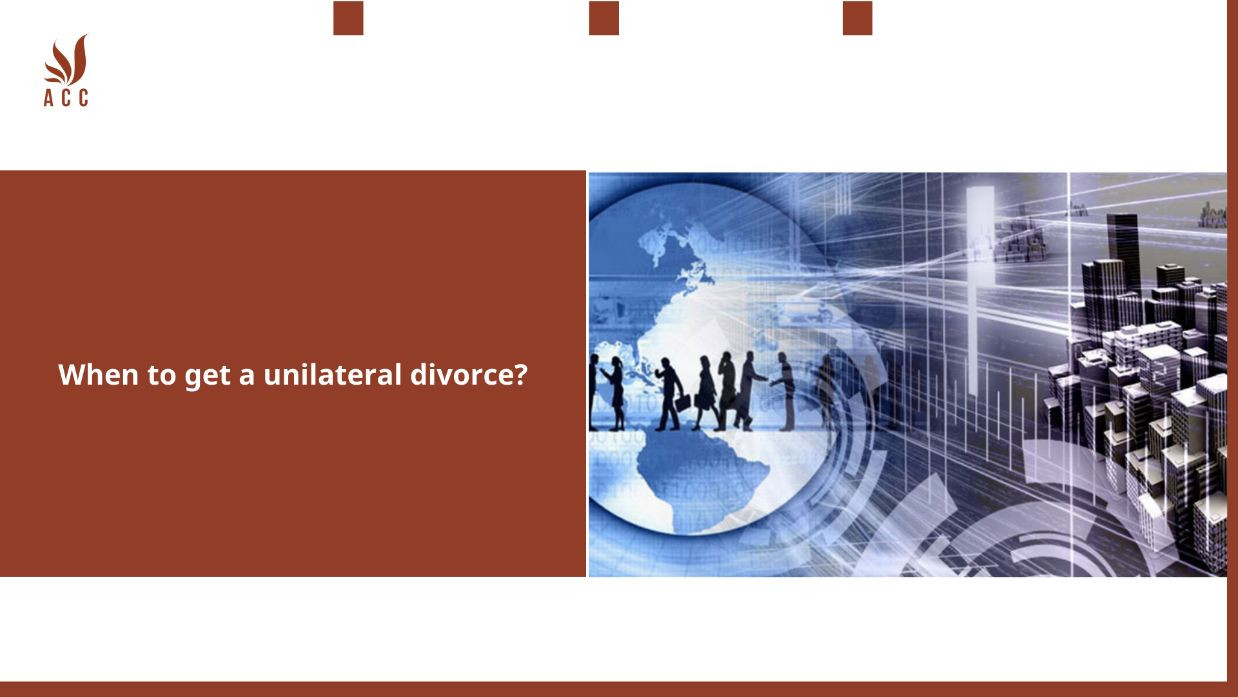
1. When to get a unilateral divorce?
When married life is not as expected, when the purpose of marriage is not achieved and one of the spouses refuses to sign the divorce papers, what should we do?
2. Conditions for unilateral divorce
According to Article 56 of the 2014 Law on Marriage and Family, unilateral divorce (also known as divorce at the request of one party) will be accepted by the court in the following cases:
(1) When a husband or wife applies for divorce but mediation at the Court fails, the Court will grant a divorce if there are grounds to believe that the husband or wife has committed domestic violence or seriously violated their rights. . The obligations of husband and wife put marriage in a serious situation, life together cannot last long, and the purpose of marriage is not achieved.
(2) If the spouse of a person declared missing by the Court requests a divorce, the Court will grant the divorce.
(3) There is a petition for divorce from the spouse's father, mother, or other relatives due to mental illness or another illness that makes him unable to understand and control his or her actions, and is also a victim of domestic violence. family caused by her husband. /wife, seriously affecting the life, health, and spirit of the spouse, the court will grant a divorce if there are grounds to believe that the spouse has committed domestic violence. seriously affects the lives, health and spirit of others.
Note that the husband does not have the right to file for divorce if his wife is pregnant, has given birth or is raising a child under 12 months old (according to Clause 3, Article 51 of the 2014 Law on Marriage and Family).
3. Unilateral divorce procedures
Unilateral divorce:
- Divorce application (form HERE);
- Marriage certificate (original);
In case the husband and wife do not issue a marriage certificate or because they do not agree with the divorce, the other party intentionally does not provide the marriage certificate, the husband and wife can apply to the People's Committee. Commune and district levels to request an extract of the marriage certificate. registration of marriage. .
- Identity card or citizen identification card of spouse (certified copy);
- Child's birth certificate in case the couple has a child together (certified copy);
- Other documents and evidence proving joint ownership such as: Certificate of land use rights (red book); Vehicle registration; notebook... (certified copy).
Steps to unilateral divorce:
Step 1: The party requesting a divorce must submit a request for unilateral divorce to the district People's Court where the defendant (spouse) resides and works. In case of divorce involving foreign elements, it falls under the jurisdiction of the Provincial People's Court.
Step 2: Pay court fees in advance
The requester (husband and wife) must pay the civil court fee advance to the district-level Judgment Execution Branch within 7 working days from the date of receiving the Court's notice.
The level of court fee advance is specified in Resolution 326/2016/UBTVQH14.
The unilaterally divorced husband and wife must return the receipt of payment of court fees to the Court within 03 working days.
Step 3: The court accepts the case, resolves the case according to general procedures and issues a judgment or decision to resolve the case. The Court will require the parties to conduct mediation at Court. In case conciliation fails, the Court will open a first instance trial.
Time limit for resolving unilateral divorce cases
Currently, there are no specific regulations on the time to resolve divorce cases, however, depending on each actual case, the time to resolve divorce cases can be 4 - 6 months (possibly longer). as short as possible). more) depending on the complexity and will of the parties.
Q&A
Question 1: What is a unilateral divorce under the law?
Answer 1: A unilateral divorce, also known as a no-fault divorce, is a legal process that allows one spouse to file for divorce without needing to prove fault or wrongdoing by the other spouse. It is based on the grounds of irreconcilable differences or the breakdown of the marital relationship.
Question 2: What are the common grounds for seeking a unilateral divorce?
Answer 2: Unilateral divorces are typically based on grounds such as irreconcilable differences, incompatibility, or the belief that the marriage is irreparable. These grounds do not require one spouse to prove wrongdoing by the other but rather reflect the desire to end the marriage due to a breakdown in the relationship.
Question 3: What steps are involved in the process of obtaining a unilateral divorce?
Answer 3: The process of obtaining a unilateral divorce generally involves:
- Filing a divorce petition: One spouse initiates the process by filing a divorce petition with the appropriate court.
- Serving divorce papers: The petitioner serves divorce papers to the other spouse, notifying them of the divorce proceedings.
- Response: The responding spouse may have a specific period to respond to the divorce petition.
- Resolution of issues: The couple may negotiate or litigate matters such as property division, child custody, and spousal support.
- Finalization: Once all issues are resolved or adjudicated, the court issues a final divorce decree.
Question 4: Are there waiting periods or mandatory counseling requirements in unilateral divorce cases?
Answer 4: In some jurisdictions, there may be waiting periods or mandatory counseling requirements before a unilateral divorce is granted. These requirements vary by location, and it's essential to consult with an attorney or research local laws to understand the specific requirements in your jurisdiction.
Nội dung bài viết:






Bình luận